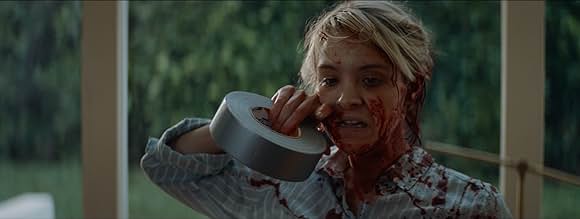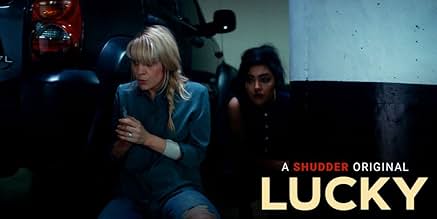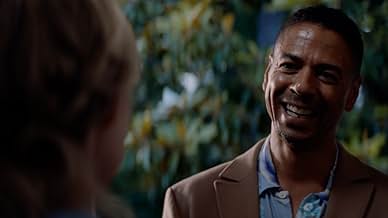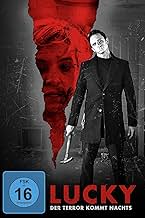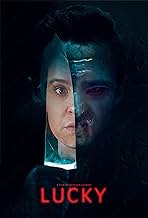VALUTAZIONE IMDb
4,9/10
2987
LA TUA VALUTAZIONE
Una donna di periferia lotta per essere creduta mentre si ritrova inseguita da una figura minacciosa che torna a casa sua notte dopo notte. Quando non può ricevere aiuto da chi le sta intorn... Leggi tuttoUna donna di periferia lotta per essere creduta mentre si ritrova inseguita da una figura minacciosa che torna a casa sua notte dopo notte. Quando non può ricevere aiuto da chi le sta intorno, è costretta a prendere in mano la situazione.Una donna di periferia lotta per essere creduta mentre si ritrova inseguita da una figura minacciosa che torna a casa sua notte dopo notte. Quando non può ricevere aiuto da chi le sta intorno, è costretta a prendere in mano la situazione.
- Regia
- Sceneggiatura
- Star
- Premi
- 1 candidatura in totale
Leith M. Burke
- Rob
- (as Leith Burke)
Nikea Gamby-Turner
- Detective
- (as Nikea Gamby Turner)
Recensioni in evidenza
I dont get all the really bad reviews for this film. It wasnt that bad but it wasn't amazing either just ok. Yes it doesnt explain a lot and yes its a looped plot film but it tries to hard for the deaper meaning than just a typical looped slasher although it probably would have been better if stuck to the loops without the deepness. The acting isnt great and can seem a bit b movie ish at times but they get the job done well enough. It did have potential to be a hell of a lot better but overall it was different from what i expected and i didn't mind that. The direction is the best part of this film. Some good shots and a mellow score with synth elements bring a nice welcomed atmosphere and help set the tone. Its not the best film ever made or the best looped style movie but its worth a watch nonetheless.
Writer and protagonist Grant has something to say about violence against women-- something to say about the ways that some women are hobbled by fear of violence. Unfortunately, what Grant has to say is not clear.
Is Lucky a study on the meaningless surreality of some of these fears, that their focus is on some masked stranger in a parking garage rather than on one's husband, the vastly more likely source of violence? Or is Lucky instead arguing that those masked strangers are inappropriately disregarded as a legitimate source of fear? Does Lucky argue that women need to stick together to escape their chains? Or does it instead tell us that women should "Go It Alone" because solidarity is hopeless? When Grant angrily insists that her success is 100% a function of her hard work, are we as the audience supposed to be cheering for her self-regard or shaking our heads at her self-importance? Are we invited to think that all men (save our husbands, of course) are responsible for our fear, or are we instead asked if we're failing to see "Schrodinger's Rapist" as something other than an object-- a man with a face, many men with many faces?
Maybe Grant isn't sure about any of that, and Lucky is just asking a lot of questions. Maybe it's less of a manifesto, more of a meditation. But if so, even that uncertainty is unclear. Lucky merely allows us to be reminded of our own questions-- or of our own certainty regarding the answers-- and if we have none, then Lucky doesn't do anything to change that.
That might be okay sometimes. Like Inglorious Basterds, Lucky seems to be fine with you ignoring the critical questions. In Lucky's case, in favor of just watching a poppy, PG-13 thriller. Unfortunately, Lucky doesn't travel the traditional scales of pop. It is a thought experiment, with little relationship to reality, yet never embraces this, never surprises us with any genuine weirdness. Any transformation here is transient-- abandoned in the third act. And there is no reveal, no catharsis; the unmasking has no impact on the movie as a work of entertainment. There is no denouement. The plot questions are never answered.
But it's not poorly made: the acting is generally decent (although there are occasional awkward missteps); it's not overly long; the production values are good. Lucky may not hit the targets it aimed for, but it's an acceptable way to blow an hour and a half.
Is Lucky a study on the meaningless surreality of some of these fears, that their focus is on some masked stranger in a parking garage rather than on one's husband, the vastly more likely source of violence? Or is Lucky instead arguing that those masked strangers are inappropriately disregarded as a legitimate source of fear? Does Lucky argue that women need to stick together to escape their chains? Or does it instead tell us that women should "Go It Alone" because solidarity is hopeless? When Grant angrily insists that her success is 100% a function of her hard work, are we as the audience supposed to be cheering for her self-regard or shaking our heads at her self-importance? Are we invited to think that all men (save our husbands, of course) are responsible for our fear, or are we instead asked if we're failing to see "Schrodinger's Rapist" as something other than an object-- a man with a face, many men with many faces?
Maybe Grant isn't sure about any of that, and Lucky is just asking a lot of questions. Maybe it's less of a manifesto, more of a meditation. But if so, even that uncertainty is unclear. Lucky merely allows us to be reminded of our own questions-- or of our own certainty regarding the answers-- and if we have none, then Lucky doesn't do anything to change that.
That might be okay sometimes. Like Inglorious Basterds, Lucky seems to be fine with you ignoring the critical questions. In Lucky's case, in favor of just watching a poppy, PG-13 thriller. Unfortunately, Lucky doesn't travel the traditional scales of pop. It is a thought experiment, with little relationship to reality, yet never embraces this, never surprises us with any genuine weirdness. Any transformation here is transient-- abandoned in the third act. And there is no reveal, no catharsis; the unmasking has no impact on the movie as a work of entertainment. There is no denouement. The plot questions are never answered.
But it's not poorly made: the acting is generally decent (although there are occasional awkward missteps); it's not overly long; the production values are good. Lucky may not hit the targets it aimed for, but it's an acceptable way to blow an hour and a half.
The killer mask is cheap. It has little horror effective elements. It is more psychological drama than horror movie. The cool mystery about the loop quickly disappeared. It was hard to care for the main character. I liked the first 20 minutes, and the last 20 minutes because there was finaly some progress. Didn't like the generalisation it gives about men. If you liked the 2019 version of Black Christmas, may be this one is for you.
This movie has promising potential that sucks you in, and then quickly goes off the rails. The concept is entertaining, but the vision was lost. It would have made for an excellent horror comedy if they could have executed at least one portion of the storyline clearly.
Although this is billed as a thriller/horror film, I'd place it more in the category of Black Mirror or Twilight Zone in that it's a satire about the state of things in the world, told with surreal/absurd elements. For example there were themes of people being disbelieved, while holding to an every-person-for-themselves attitude, further preventing people from getting support. There's much more to it than that (gender and class) so I'm summarizing very briefly.
Other points: Some of the acting was stiff at times but that became an advantage during brief kafkaesque scenes of the protagonist attempting to communicate. With surreal elements, it often comes with the territory in any case. The music was minimal and rather than announcing everything that was about to happen, it left space for the imagination to fill in the blanks, only containing a few themes that repeated, along with a few key visual leitmotifs.
I can see how a person following this as a literal story with a straightforward protagonist might expect things to go differently, but I felt a definite tension leading up to the end, wondering how the director would play out the themes presented in the story. Perhaps intentionally on the part of the director, while I felt sympathy for the main character, I felt even more for a few of the side characters, especially toward the end of the movie.
Overall I enjoyed the movie, found the themes timely, and will look up other movies by this director.
Other points: Some of the acting was stiff at times but that became an advantage during brief kafkaesque scenes of the protagonist attempting to communicate. With surreal elements, it often comes with the territory in any case. The music was minimal and rather than announcing everything that was about to happen, it left space for the imagination to fill in the blanks, only containing a few themes that repeated, along with a few key visual leitmotifs.
I can see how a person following this as a literal story with a straightforward protagonist might expect things to go differently, but I felt a definite tension leading up to the end, wondering how the director would play out the themes presented in the story. Perhaps intentionally on the part of the director, while I felt sympathy for the main character, I felt even more for a few of the side characters, especially toward the end of the movie.
Overall I enjoyed the movie, found the themes timely, and will look up other movies by this director.
Lo sapevi?
- BlooperAt 19:32, when May is talking to Ted's sister Sarah, her iPhone isn't compatible with the case she's using.
- ConnessioniFeatured in Dead Meat Podcast: Interview with Brea Grant (2021)
- Colonne sonoreSign of the Times
Written by Hannah Fairlight
Produced by Michael Wagener
Performed by Hannah Fairlight
I più visti
Accedi per valutare e creare un elenco di titoli salvati per ottenere consigli personalizzati
- How long is Lucky?Powered by Alexa
Dettagli
- Tempo di esecuzione1 ora 23 minuti
- Colore
- Proporzioni
- 2.39 : 1
Contribuisci a questa pagina
Suggerisci una modifica o aggiungi i contenuti mancanti




